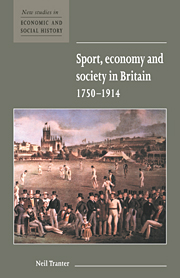1 - Introduction
Published online by Cambridge University Press: 18 December 2009
Summary
From the dawn of human civilisation, it seems, the need for some form of sporting physical recreation has been almost as imperative to human beings as the need to procreate, work and eat. In practice, of course, the extent to which this need was satisfied varied greatly from time to time and place to place. In some pre-industrial societies opportunities for indulging in sport were often severely circumscribed by adverse demographic, economic or political circumstances. In others, like that of mid-eighteenth century Britain, environmental circumstances were more favourable and levels of participation in sport accordingly much higher. Yet, thriving though it was, the sporting culture of the early Georgian age was in many fundamental respects very different from that which had emerged by 1914. Compared with its Edwardian successor, the sporting world of 1750 was restricted in the number of sports it offered and the percentage of the population it regularly attracted. It was also localised in its geographic range, irregular in its availability and timing and largely devoid of institutional structures and commonly accepted written rules – and disturbingly violent. Admittedly, none of these characteristics were entirely absent from the sporting culture of the Edwardian period. They were, however, no longer sport's predominant features. Excessively violent sports had either almost completely disappeared or, as illustrated by the transition from bare-knuckle prize-fighting to gloved boxing under Marquis of Queensberry rules, been transformed into far less brutal recreations. The range of sports available and the numbers of people playing and watching them had markedly increased. Sport had become extensively institutionalised, codified and commercialised and had spread beyond a purely local or regional arena into national and even international competition.
- Type
- Chapter
- Information
- Sport, Economy and Society in Britain 1750–1914 , pp. 1 - 2Publisher: Cambridge University PressPrint publication year: 1998



